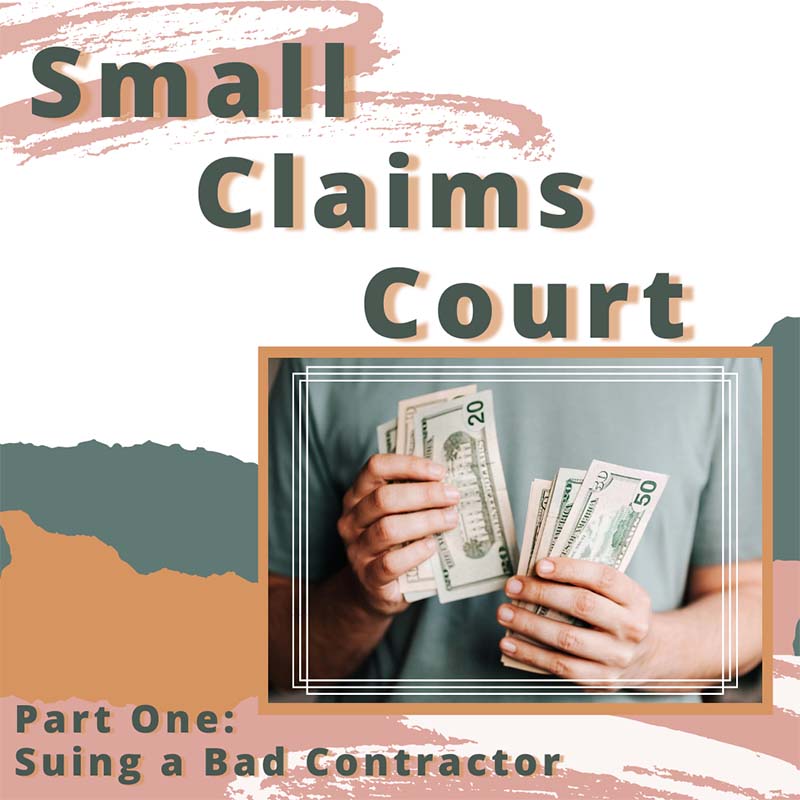
Hired a bad contractor? Want to get him back? How do you sue?
I'm lawyer Alexandria Serra, this blog post is inspired by my latest Lawyer Talk Thursday (catch it on Instagram @alexandriaserra), and you're about to find out!
It's time to get you familiar with the Justice of the Peace Courts (JP Courts). They handle landlord/tenant issues, Class C Misdemeanor or criminal cases, and civil lawsuits up to $20,000. If you hear someone say, “small claims”, JP Courts are what they're talking about.
We’re Suing: A Sample Scenario
You hire a contractor to turn your garage into an apartment. You and the contractor sign a contract that sets out the terms, payment, and other things. After the contract is signed by all parties, if the contractor backs out on their promises, doesn't finish, or ghosts, then you can have a lawsuit for breach of contract. In this case, you did everything right by communicating your expectations and putting the agreement in writing. Now, it’s time to prepare for filing your small claims suit.
Time to Sue Them
You'd start by filing a petition with the Justice of the Peace Court where you live, or where the damage occurred. The El Paso County Justice of the Peace Courts website has a sample petition online that you can fill out and file yourself, for a small filing fee. You don't need a lawyer, but in the petition make sure that you include:
- Why you're suing
- What the defendant did wrong
- How much money you're claiming back
You’ve Been Served!
The next step is to notify the defendant (the contractor in this example) that a lawsuit has been filed. A citation is an official notice that lets all parties know that begins the court process.
The defendant gets a copy of the petition and so does the plaintiff. The defendant has to be served but you can’t do that yourself. A defendant can be served in various ways but the most common way is in person by a constable, sheriff, or private process server. The defendant has a short period of time to file an answer or response to the plaintiff’s claims.
If the defendant doesn’t answer then they're going to get a default judgment in the plaintiff’s favor, which means you win! We see this happening in court all the time. For the sake of this example, let's say our contractor filed their response to the small claims suit, now what?
The court sets a date for a hearing. At any time before or after the hearing, the parties (you and the contractor) can settle outside of court. Then there are no more lawsuits.
It’s Court Time
The next step is for you to prepare your evidence for JP Court.
JP is the people's court, like on TV, so it's perfectly acceptable to represent yourself. If you feel like it's too complicated or you don't have time, you can always hire a lawyer.
Here are some tips for small claim suits:
- Don't just sue to sue.
-
- Some people feel wronged that aren't actually legally entitled to damages or money.
- JP Courts are courts of equity.
-
- They're not going to give you more than you're entitled to and they can only award you money, not specific performance, or require that contractor to come back and fix your garage.
- You may get attorney fees in some cases.
- The plaintiff has a burden of proof so you have to convince the judge or jury that you're right.
- If it's a big case, over $20,000, you'll need to file in county court. You can't just hang out in JP Court.
- You are entitled to request a jury trial, and you (or your lawyer) would pick a jury and argue with them but COVID has caused some disruptions to this process.
The Bottom Line
Remember, it’s smarter to hire contractors or other folks who are bonded or insured. Their insurance will step in when you sue. Otherwise, you may end up with a judgment (or a document saying you win) that really means nothing. You’ll have to go through some additional steps to collect if that person doesn't actually have the money to pay you.
If you're being sued, make sure you answer within the right time period. When doing a job, get expectations upfront and communicate them effectively. Get everything in writing, especially if the circumstances change.
Remember, just because you're unhappy with the way something turned out doesn't mean you can sue for it. On the flip side, don't do shitty work, ghost, or break promises. We're watching.
If you have any questions, feel free to email me at info@serralawpllc.com.
